Lingua Sinica Newsletter, 11 October
News, analysis, and commentary on Chinese-language media from the PRC and beyond.
Welcome back to Lingua Sinica.
You might’ve noticed that this week’s newsletter is coming to you one day later than usual. Yesterday was, of course, a public holiday here in Taiwan — the 113th birthday of the Republic of China (ROC). Celebrating Taiwan’s National Day on the date an uprising began in far-off Wuchang, in a country then-Japanese Taiwan was not even part of, fails to resonate with many Taiwanese these days. But it’s as good a chance as any to celebrate all that the country has accomplished and to demonstrate to the rest of the world how modern Taiwan sees itself and its place in the world.
Both PRC state media and outlets aligned with the opposition Kuomintang (KMT) at home have been keen to present President Lai Ching-te of the ruling Democratic Progressive Party (DPP) as a dangerous, pro-independence firebrand. But observers expecting smoldering rhetoric from Lai yesterday would have been disappointed.
This year’s celebrations included ROC visual language unseen since Tsai Ing-wen took office in 2016. In his national day address, Lai paid tribute to both the 1911 Wuchang Uprising and the 1949 Battle of Guningtou, when the ROC army repulsed an attempted Communist invasion of Kinmen — historical touchstones much more closely associated with the KMT. By the time he stepped off-stage, Lai had mentioned the Republic of China more than Tsai ever had. Some local media — at least those broadly associated with Lai’s Democratic Progressive Party — have picked up on this, although official voices across the Strait are still sticking to the same old line.
If you’re still reading at this point, that probably means you share our interest in Sinophone discourse generally and Taiwan in particular — and that means you’ll love the latest offshoot from Lingua Sinica and the China Media Project. Tian Jian, launched just this week, is our first Chinese-language offering. Edited by veteran Taiwanese journalist Heng Yu Chien, it offers inside perspectives on the issues facing Chinese-language media and looks at what tools and advice from around the world can bring to the space. Subscribe here and see for yourself.
Ryan Ho Kilpatrick
CMP Managing Editor
STORYTELLERS
It’s Always Sunny in Lhasa
“City of Daylights” (日光之城), one of China’s latest drama series, is unique in at least one way. A co-production between state broadcaster CCTV, the popular Hunan entertainment company Mango TV, and the Xizang Autonomous Region’s Culture Department, the story is set in the Tibetan capital of Lhasa. Its plot revolves around the trials and tribulations of a group of young Tibetans chasing their dreams. The first episode premiered on the PRC’s national day on 1 October, and since then state media have been heaping praise on the series. Official news agency Xinhua says it “vividly reflects the happy lives of contemporary Tibetan people.”
It’s a rare thing for a Chinese TV show to put Tibetans center-stage. CCTV says they did their research, too, striving to present an “authentic Lhasa” and conducting over 130 interviews with local residents to create their characters. But watching the show, it’s clear that the target audience is Han Chinese. Tibetan characters live prosperous lives in pristine courtyard homes, and their hard work earns them a smooth ride up the career ladder. Camera shots linger on steaming bowls of yak butter tea and elaborate Cham dances. Curiously, none of the Tibetan characters speak to each other in Tibetan. Instead, they communicate in Mandarin Chinese.
In short, it’s exactly how the Han majority would like to see Tibet: a picturesque holiday destination filled with happy, hardworking, and grateful locals, aesthetically exotic yet fully integrated with the majority culture. But how realistic is the Han gaze in this case?
Some Tibetans seem confused as to why they can’t watch a show about themselves in their language. On the popular review site Douban (豆瓣), one commenter asks why there’s no Tibetan-language version of the show. Another concedes that “Han-Tibetan friendship and ethnic unity are great topics, but this doesn’t give [Han people] a realistic depiction of Tibet.” Leaving a two-star review, a third netizen bemoaned how “scenery films (风光片) masquerading as dramas, like this, have become more and more common over the past few years.”
NEWSMAKERS
Serving Up a Transformation
Late last month, a Facebook post from the head chef at one of Taipei’s newest restaurants unexpectedly made a splash in the region’s Chinese-language media. The author was no Michelen-star ming chu (名廚), either — in fact, it was her first gig in the industry.
That’s because head chef Tanya Chan Suk Chong (陳淑莊) is a former Hong Kong Legislative Councilor and one of the founding members of the Civic Party (公民黨), an opposition political party that was dissolved last year amid the city’s ongoing national security crackdown. In her post, Chan shared that she moved to Taiwan three years ago, not long after finishing a suspended jail term for her role in the pro-democracy Umbrella Movement protests of 2014.
A lawyer by training, Chan sounded just as surprised by her career change as readers were liable to be. “Becoming a chef was nothing but a miracle for me,” she wrote. “As a barrister and lawmaker, I didn’t have the time for cooking back then in Hong Kong.”
Hong Kong InMedia (獨立媒體), one of the city's last remaining pro-democratic online news websites, picked up the story, which happened to coincide with the 10-year anniversary of the Umbrella Movement. So did HK01 and Ming Pao, and state-run outlet Dot Dot News, in an article accusing Chan of “scurrying” to Taiwan like a rat and calling her a “shit-stirrer.” In Taiwan, it also caught the attention of Radio Taiwan International and the Central News Agency.
Chan’s restaurant, Red Cotton (紅棉), shares the same name as Hong Kong’s Cotton Tree Drive (紅棉路), which meets Harcourt Road in Admiralty near the Legislative Council chambers, where the Umbrella Movement protests first broke out. Located in the capital’s eastern Songshan district, Red Cotton doesn’t officially open until next month, but it already has over 13,000 likes on Facebook.
SPOTLIGHT
Escaping Taiwan’s Pedestrian Hell
Taiwan has a reputation as “a living hell for pedestrians” (行人交通地獄) and, living here, it’s not hard to see why. Every year, thousands are killed on its streets. Among OECD nations and territories, only the United States of America has more road fatalities by population.
Anecdotally, I don’t think it’s much of an exaggeration, either. Few are the days I don’t witness or experience a near-miss on the streets of Taipei — itself, in another indication of the problem’s scale, by far the most pedestrian-friendly major city in the country. Even here, stop signs are purely decorative and it’s never a question of whether vehicles will run a red but how many will. There’s even a vocabulary particular to Taiwan, where sidewalks (人行道) are assumed to be nearly-useless painted lines unless you add the modifier “physical sidewalks” (實體人行道).
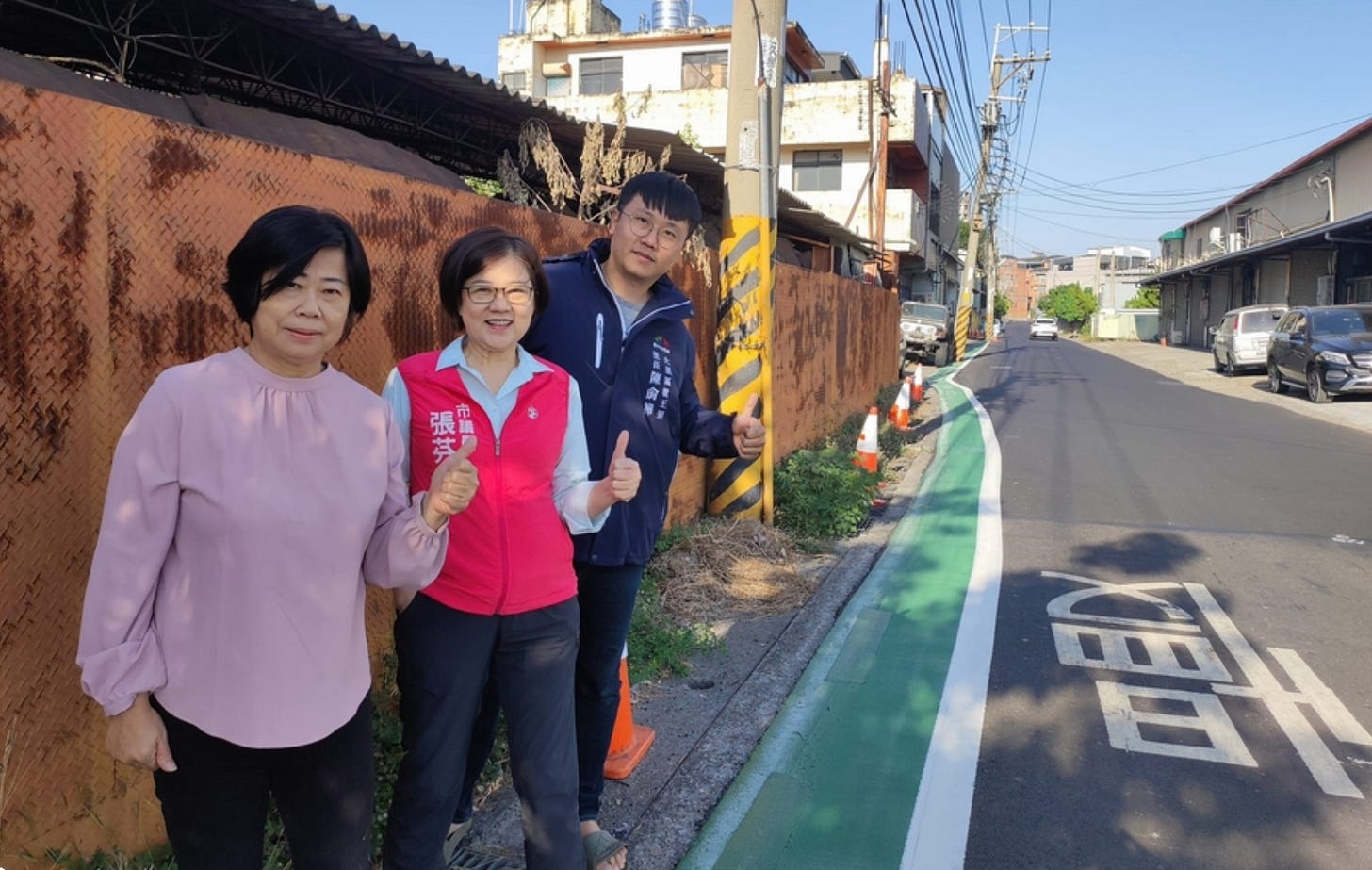
It’s a very common gripe among both foreign residents and, increasingly, Taiwanese themselves. But reporting rarely adds much to the conversation, beyond broadcasting the latest tragic case. So it was a treat to read the latest take on the topic from independent digital news outlet The Reporter. Their feature “Taiwan is Known as a ‘Pedestrian Hell’ — Why Are Our Roads Designed to be Unsafe?” takes a characteristically nuanced approach. It offers illustrations of very easy fixes that could be made to Taiwan’s roads, as well as an exploration of the popular myths and bureaucratic hurdles preventing even these basic improvements.
Lying Down for Public Housing
In Hong Kong’s high-priced property market, expensive and cramped rental spaces have made competitive public housing allotments extremely sought after. Back in July, Hong Kong Chief Executive John Lee Ka-chiu (李家超) told journalists ahead of a cabinet meeting that some young people in the city were “deliberately” (好刻意) driving down their incomes in order to qualify. Lee suggested then that young people would come to regret their choices if they restrained their professional dreams purely to make themselves eligible for housing assistance.
But Lee’s admonishments ring hollow against the hard realities facing younger Hongkongers who dream of real living space.
In a special report this week, the Hong Kong exile news outlet Photon Media explores this phenomenon, drawing on a recent survey by Hong Kong’s pro-Beijing Federation of Public Housing Estates. The survey found that 30 percent of respondents between 18-40 said they would resort to “lying flat” (躺平) — a now popular movement urging rejection of the pressure to strive for success [CMP Dictionary] — in order to make themselves more eligible for public housing. An equal proportion in the survey said they would even try to avoid a pay raise or promotion if it placed a public housing allotment in jeopardy.
Learn more about this trend at Photon Media.
CHAIN REACTIONS
This is Radio China
Transmitting from the heart of Madrid, China FM (华夏之声中文电台) is the only radio station in Europe that broadcasts exclusively in Mandarin. Launched in 2017, it provides the over 239,000 Chinese nationals living in Spain with news, entertainment, and cultural programming. Founder and controller Ding Dawei (丁大伟) is a veteran journalist with years of experience as reporting from Europe for the Communist Party’s official People’s Daily (人民日報).
The station offers a variety of programs, ranging from music and cultural exchange to news bulletins and information for PRC citizens in the region. Controller Ding sees Radio China FM as “fulfilling a social function” and acting as “a mouthpiece for the Chinese community.” But its close ties to the Chinese embassy and state media suggest this isn’t the only way in which it serves as a “mouthpiece.”
China FM says it is “approved and supported” by the PRC embassy to Spain. How it attained official approval and what that support constitutes is unclear, but the station is also partnered with China Radio International (中国国际广播电台), part of the China Media Group stable under the direct control of the CCP’s Central Propaganda Department. China FM also boasts of partnerships with official outlets like the People’s Daily and China Central Television (CCTV).
Content-sharing agreements are hard to avoid if you want to fill 24 hours of airtime, 365 days a year, on a shoestring budget. But China FM isn’t the small-time operation one might imagine. Within its first year on the air, the station was already expanding internationally. Today, it operates in Milan, Florence, Torino, and Rome, in addition to its original Spanish service.
QUOTE/UNQUOTE
A Closer Look at Myanmar
Border Eyes (邊境之眼) is a new Chinese-language platform focusing on coverage of Myanmar issues. It was started by independent Taiwanese journalist Will Yang (楊智強), who teamed up with exiled Burmese journalists and media outlets to bring more in-depth coverage of the country to Chinese-language readers.
We recently sat down with Yang to discuss the project. Below is a brief excerpt from that interview. You can find the full interview on our recently launched Chinese-language sister publication, Tian Jian.
Lingua Sinica: What motivated you to start Border Eyes, and what challenges have you faced so far?
Will Yang: After leaving my job at The Reporter last year, I often visited Myanmar and met many exiled Burmese journalists at the Myanmar-Thailand border. I saw a Japanese documentary filmmaker who started his own project translating exiled Burmese journalists’ reports into Japanese, letting more Japanese people read news about news in the country. I thought, why not report in Chinese? There are more Chinese-language readers than Japanese-language readers and there are many Chinese speakers in Myanmar itself. I collaborate with exiled Burmese media outlets because they have personal networks and understand the situation in Myanmar better than me. I also hope that it will be a bridge for collaboration between Taiwan and Myanmar. Like other startup media outlets, the main challenge for Border Eyes is money. To keep the platform running, we have to look for more funding or collaborate with other media outlets.
LS: What’s the biggest difference between Border Eyes and other Chinese-language media outlets?
WY: Right now, most of the Myanmar-related reports published by Chinese-language media outlets are daily news. Border Eyes is working on reporting Myanmar issues from different angles. For example, we may still focus on the civil war, but it’s related to the economy, people’s livelihood, crime — everything. Border Eyes produces in-depth reports, which is not something special in itself, but right now there’s nowhere else doing this.
LS: Do you have any suggestions for other Chinese-language outlets reporting on Myanmar?
WY: It’s hard to cover the civil war that is taking place now through short-form content. While visiting Yangon, people would not feel that there is a civil war. The junta wants people to see that it’s peaceful in Myanmar. My suggestion would be not to view Myanmar in simple terms. Just because there aren’t in-depth explorations doesn’t mean things there are simple.
GOING GLOBAL
China Finds a Voice in Neil Bush
Having friends in high places is always a good thing for the Chinese government. Late last month, Neil Bush — son of former president George Bush, brother to former president George W Bush, and the founder of the George H.W. Bush Foundation for US-China Relations — said in interviews with the People’s Daily, China Daily and CGTN that the US was too paranoid about China. He told the People’s Daily that he wished the US would welcome more Chinese investment in the country. “If we win, you win, everybody wins,” the China Daily quoted him as saying.
It would certainly be a win for Bush, who has had business interests in China for decades. In 2016, he co-founded two Chinese-registered companies offering advice on mergers and acquisitions and investing in US assets.
In a speech to the 2019 China Development Forum, Bush reasoned that China isn’t a threat because, “from my understanding of history, China has never used force to impose its will on other countries.” He added that the US has no grounds to interfere in China’s internal affairs because it has been unable to solve its own domestic issues. China’s Ministry of Foreign Affairs and Central Propaganda Department have been saying the same thing.
In 2023, Guancha (观察者) published an interview in which Bush said US views on China are only negative because Americans are “brainwashed by propaganda.” If they visit China, he suggested, they “will see how friendly the Chinese people are, how delicious the Chinese food is, and how clean the air is.”
In a 2021 interview with the Center for China and Globalization (全球化智库), Bush said that the country’s rapid development during the reform era had convinced him that “there is no single system that works for every country… every country needs to develop a system that suits its conditions, and the Chinese system works for China.”
ON A LIGHTER NOTE
A Deluge of Memes
Last week, Typhoon Krathon tore through southern Taiwan, killing two, injuring 667, and leaving thousands without power or running water. Up here in the north, though, it was a different story — besides the occasional gust and a little drizzle, it was a day much like any other. Yet the cities of Taipei, New Taipei, Taoyuan, and Keelung all shut down for a very anticlimactic two days.
Many have questioned that decision. But in the famously “Rainy City” (雨都) of Keelung, one local politician did her bit to defend the call, posting a photo to Facebook of herself inspecting a flooded street.
If this image looks a bit off to you, you’re not alone. Taiwanese netizens quickly realized it was a bad photoshop job and called out the city councilor, Sung Wei-li (宋瑋莉) of the Kuomintang (KMT) that currently governs all these cities. It didn’t take long for Sung to admit the picture was doctored. But instead of apologizing, she claimed to be a victim of “cyberbullying” and partisan press coverage. She also threatened to sue anyone who continued to share her original post.
On what legal grounds, perhaps we — along with every news outlet in the country — will soon find out. Internet users were not deterred, however. In the days since, the image has only been further photoshopped and shared, becoming a political meme that’s taken Taiwan by storm.
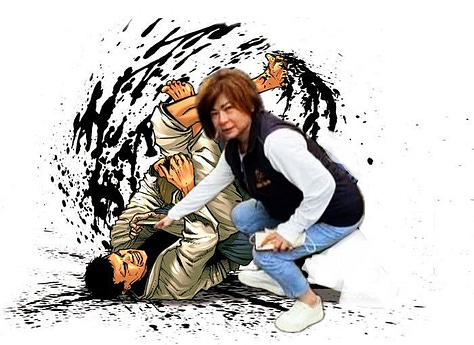
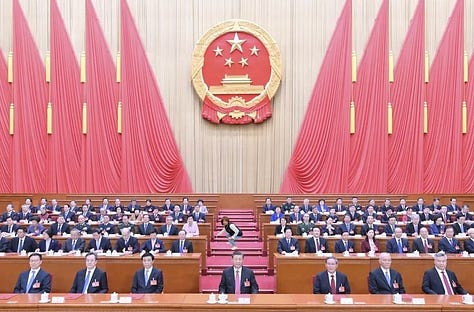

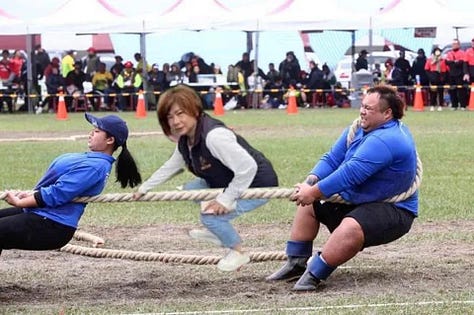





TRACKING CONTROL
China’s Sentinel State
Hype around China’s “digital panopticon” is huge. But according to Minxin Pei, an expert in Chinese governance and mass surveillance, cutting-edge tech is just one part of the Party-state’s toolkit, which also leans heavily on manpower and pervasive self-censorship — what he calls China’s “sentinel state.” In a recent interview, Pei told us about what makes the CCP’s brand of mass surveillance unique, considering how it anticipates rather than simply reacts to dissent and how it combines the latest technology with grassroots mobilization and internalized censorship, involving citizens in the very machinery controlling them.
Here’s a brief excerpt of our conversation. Find the full thing on the CMP website.
Lingua Sinica: What is the “sentinel state,” and how does it differ from the more familiar concept of the surveillance state?
Minxin Pei: In my book, I introduce the concept of distributed surveillance, highlighting how China conducts its surveillance distinctly. While all dictatorships employ repression, the most sophisticated ones, like China, lean heavily on preventive rather than reactive measures — essentially ex-ante repression versus ex-post repression. The real challenge lies in designing an effective system for this preventive repression.
LS: Which is more important for this sentinel state — the technologies of repression or the human resources of state control?
MP: There’s often too much focus on technology itself. While it can be a useful tool, it is used by people. And let’s not forget that technology has lots of blind spots. It can accomplish many tasks, but if people implement countermeasures, technology becomes ineffective. For example, if someone wears a mask or a hood, facial recognition systems struggle to identify them. Similarly, if you hide your phone in a Faraday bag, the government loses track of your movements. There are lots of limitations to technology. This is why I believe the most effective approach combines human intelligence and technological resources.
Find out more about the “sentinel state” here.
CMP HIGHLIGHTS
Wedding Nationalism to Natalism
When teachers Wan Yi (万亿) and Guo Yong (郭勇) tied the knot in Shanghai on September 22, they shared their special day with over 5,100 other couples. All of them were taking part in a series of mass weddings held in 50 locations across China, organized by the country’s official women’s rights organization together with various government agencies. The Communist Party secretary for the All-China Women’s Federation (ACWF), Huang Xiaowei (黄晓薇), officiated the ceremony, congratulating the newlyweds for “acting as practitioners and advocates for a new marriage and child-rearing culture.”
Huang’s patriotic blessing jars with the romantic ideal of marriage as an expression of love between two individuals, but it encapsulates an increasingly prevalent attitude in PRC state media. As China struggles with a slowing economy and looming demographic crisis, the number of Chinese couples getting married has fallen to a 12-year low. And with the number of marriages closely tied to the number of births, policymakers are determined to boost the country’s shrinking population. State media is doing its part by exalting marriage and reproduction as patriot acts. At the same time, organizations like the ACWF, set up to advance women’s role in society, now harken back to their roles as mothers and caretakers instead.
For more on how state media and even women’s rights organizations in China are promoting a return to traditional marriage, read “Married to the Motherland” on the CMP website.









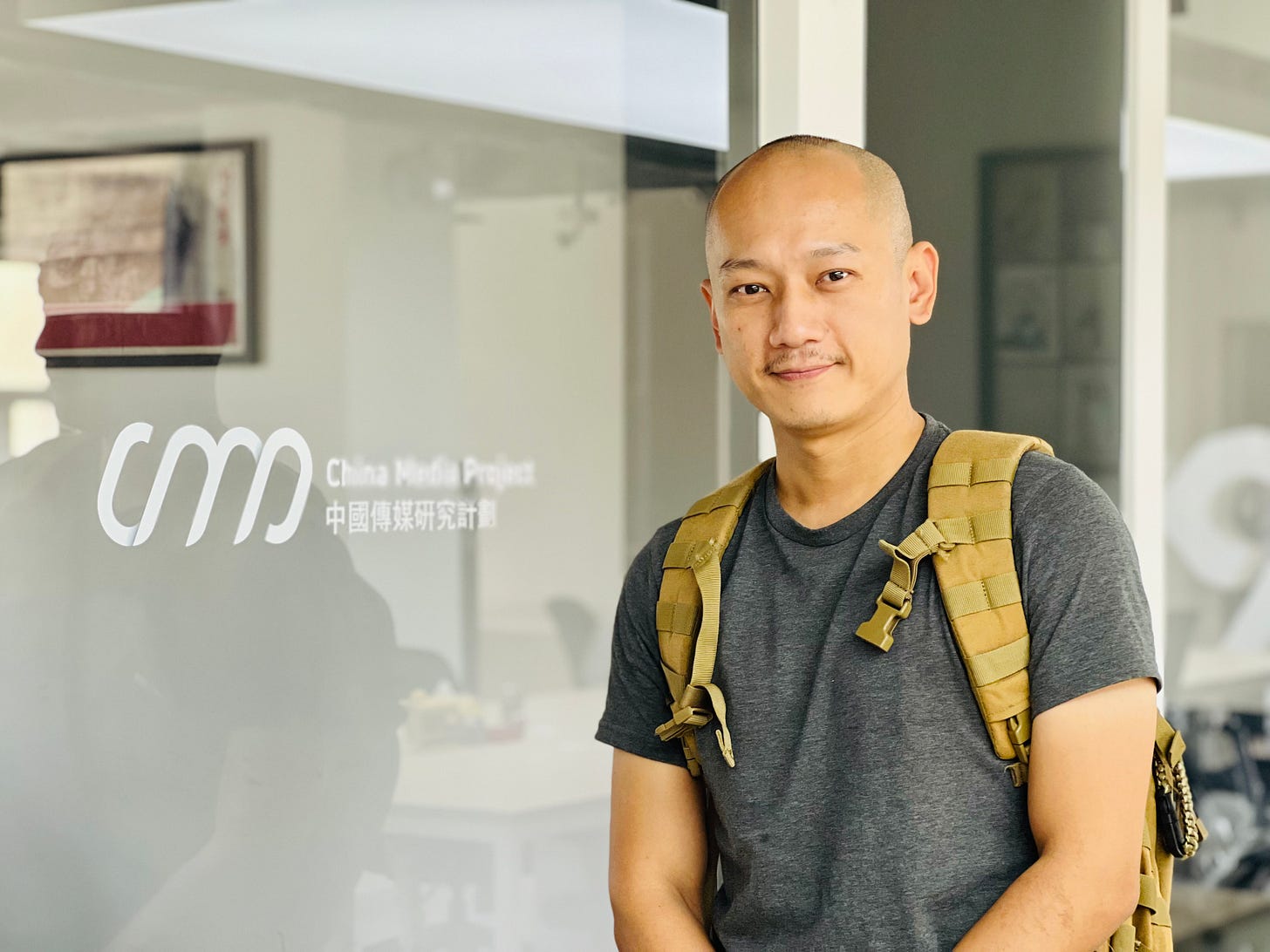



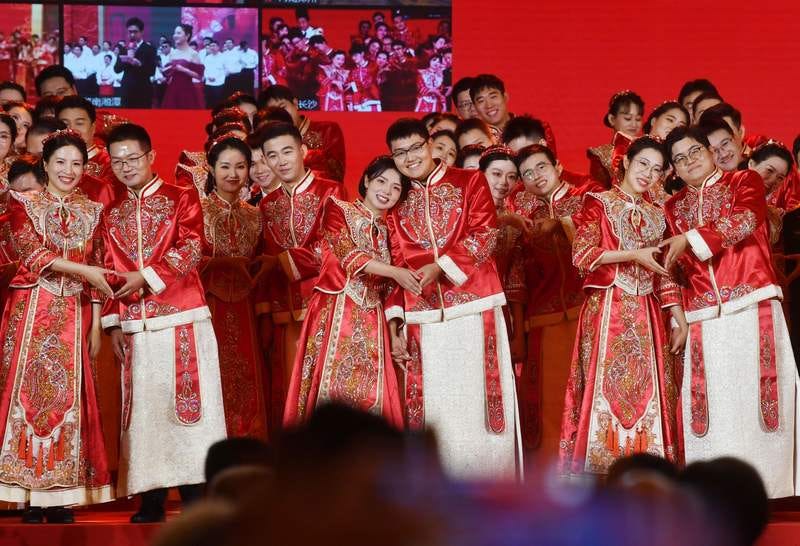
In the late 1990s, after living in China for 11 years, I was looking to get a degree in China. I had passed the HSK requirements that didn't force me to take Chinese. Besides, I wasn't interested in getting a BA in Chinese. A close Tibetan friend suggested I go to Tibet and study Tibetan. His family worked in the Autonomous Region's government and could help arrange it. But I didn't want to be under constant scrutiny as a white guy in Tibet would be in those days. So, he suggested Inner Mongolian, close to Beijing and not as political. Four years later, I ended up getting a BA in Mongolian Language and Literature. It was fascinating. I even spent a summer living with herders in the grasslands.
I remember my Tibetan friend explaining to me the tight historical and cultural connections between the Mongols, Tibetans, and Han comes, as I was considering learning Uygur. After four years learning about the Mongols I realized I had a better understanding of the Tibetans, too!
Later, Inner Mongolian TV invited me to take trips to different cultural areas around Inner Mongolia to create a mini-series to introduce the Mongolian culture to China. It was done in Mandarin. I understand the Tibetan perspective, and perhaps my situation is different, but there is still great value in promoting the culture and prosperity of Tibetans today for all to see in Mandarin. Doing it in Mandarin captures the largest audience. 🙏🕯️